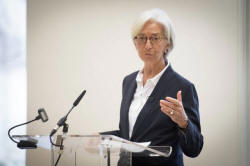IMF's Lagarde says pre-Brexit warnings vindicated by
slower UK growth
 Send a link to a friend
Send a link to a friend
 [December 20, 2017] [December 20, 2017]
By Andy Bruce and David Milliken
LONDON (Reuters) - Britain's economy is
already suffering from last year's vote to leave the European Union -
fulfilling previous warnings that Brexit supporters had dismissed as too
gloomy, International Monetary Fund chief Christine Lagarde, said on
Wednesday.
Before the June 2016 referendum, Lagarde had said Brexit would have
"pretty bad to very, very bad" consequences for Britain, angering Brexit
backers who viewed the body as exceeding the limits of its expertise.
Speaking in London as she presented the IMF's first full assessment of
Britain's economic performance since the Brexit vote, Lagarde said
British growth was "a bit of a disappointment" compared to strength
elsewhere in the world.

"The UK economy is already losing out as a result of this decision," she
said at a news conference alongside finance minister Philip Hammond.
"That narrative we identified as a potential risk in May 2016 is
actually being rolled out as we speak. It's not experts talking - it is
the economy demonstrating that," Lagarde said.
Firms were delaying investment until they had more clarity about future
trade rules, and she urged Britain and the EU to reach a deal soon on
transitional arrangements for March 2019.
The IMF said Britain's economy was set to grow by around 1.5 percent in
2018, in line with its previous forecast, after growth of 1.6 percent in
2017, slower than in many other advanced economies. The forecast for
2018 was based on the assumption that Brexit negotiations continue to
make progress.
In its report on Britain's economy, the IMF said Britain may need to
raise more money from taxes to bring down its budget deficit after
relying heavily on squeezing public spending.
[to top of second column] |

International Monetary Fund Managing Director Christine Lagarde
speaks at a press conference to launch the publication of the 2017
Article IV assessment of the UK at the Treasury in central London,
Britain, December 20, 2017. REUTERS/Stefan Rousseau/Pool

"Deficit reduction since the financial crisis has relied mostly on
spending measures," the IMF said.
"While the government should continue to seek the best value for money
in public spending, a more balanced approach to deficit reduction may be
called for in future," it said.
The impact of Brexit on the economy and Britain's low productivity
growth could hit tax revenues, while demands on public spending would
increase as the country's population grows older.
"Under these circumstances, greater reliance on revenue measures for
consolidation (of the budget) than in recent years may be warranted,"
the report said.
Finance minister Hammond said he shared the IMF's concerns about
Britain's high levels of public debt.
The report also welcomed recent progress in the Brexit talks with
Brussels but said the timeframe for negotiating a new trade deal was
ambitious.
(Additional reporting by William Schomberg)
[© 2017 Thomson Reuters. All rights
reserved.] Copyright 2017 Reuters. All rights reserved. This material may not be published,
broadcast, rewritten or redistributed.
 |